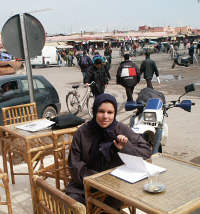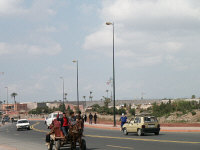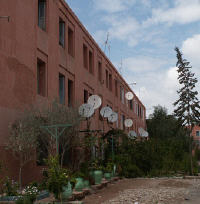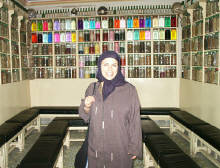Day 4: Off the Beaten Path
April 14th, 2002


Coffee on the edge of Djemaa
![]()
![]()
I took a bit of a risk in the morning and found a seat in a cafe right on the plaza. Cafes here are the domain of men. My book advised that female travelers may feel more comfortable having tea or coffee at a patisserie or restaurant but it was too nice a day for indoors. The spot I found, on the corner of a low wooden platform on the edge furthest from the souq entrance, had a few mixed gender groups but was certainly the only woman sitting alone. No one seemed bothered to care one way or the other, and I was left alone to enjoy my cafe au lait and the late morning sun.
The sun shone down in sheets of glare and I wished I’d brought sunglasses, but it was better with my eyes closed anyway. Better to smell the comforting and familiar sent of coffee, all wrapped up in a heady drift of foreign cigarette smoke, orange peels in the sun, and the beginning of mid-day cooking. Better to listen to the rising cacophony of daily life – drums and horns and bells, hawkers and hustlers and holiday makers. Better to feel the sunlight seeping through the dark blue scarf over my hair and the long gray djellma I wore over my jeans and T-shirt.
A trail of high clouds cast racing shadows across the square. The shift from light to dark to light again distorted the few splashes of color, darkening the dry mint green of the palms and the dusty pink of the building. The swaths of exposed pavments between knots of people looked bleached and packed as if the presence of so many desert people were turning it to sand. People are constantly entering and exiting the square in tiny rivulets of color, but the density of the crowd seems to stay the same. It seems like everyone in the world would cross this busy little spot sooner or later.
I heard a large car pull up and looked over to see a polished black 4-Runner park alongside a row of donkey carts. A window on the far side was rolled down and a man shouted something into the plaza. Three veiled woman hurried over, each with a small plastic stool in one hand. Two of them came around to my side and plunked down next to the car. The passenger side door opened and a pale foot tentatively extended out of the tinted interior. Out of the back window came a pair of hands. That was all I could see and it made no sense, till one of the plaza-woman started applying henna to the disembodied limbs. A pit-stop on the way to a party I assumed.
I finished my coffee mulling over a life where privilege meant seclusion and the world was seen through tinted windows or thin black cloth. Did the henna women envy the owner of the pale manicured foot? Did the daughters of the party-goers stare longingly at the orange-stained figures sitting in the sunlight on cracked blue plastic stools? Being a tourist was too much like being a houseguest. You see what you are meant to, and are never invited to look under the bed or in closets.
My plan for the day was not to have a plan. I had two vague goals: a park called Agdl Gardens on the far side of the Royal Palace, and another assault on the Ben Youssef Mosque. The walk to the Gardens would take me through the Kasbah (OK, everyone sing along “rock the Kasbah… la la la”) and the true residential area of the Medina. True enough, after only a few minutes there were no more signs in French or English and I was again the only Westerner.
The shops were not so flashy as those in the souq. Most displaying hardly any wares at all, maybe a djellma in a window, or a few wilted vegetables on a shelf, and the occasional rug shop. Everything was very quiet and just warm enough to make me feel like I could almost be sleep walking. The street was narrow and made of hard packed dirt. It looked freshly swept and I wished streets in Geneva were so clean and well tended. The more one block started to look like the next, the more I began to see the details of each building. All were two or three stories, the same shade of pink or yellow that reminded me of the fake adobe downtowns of southern California. Some had a few plants set in window boxes behind wrought-iron bars, a few had decorative wooden doors, others were adorned only with a line of clothing strung under the eaves.
I tried following some of the small alleyways that branched off from the main lane every few yards, but they all came to awkward dead ends where woman and children would stop their chat and play to wonder at the stranger suddenly at their door. It had only taken me a day or two before I almost stopped registering the inevitable double-takes and outright stares from locals realizing that, despite my clothing and covered hair, I was not from this neck of the woods.
The looks from the woman and the shy smiles and waves from children were now in my mind harmless curiosity. The response from young men and teenage boys was a little harder to tune out. Usually it was just an intense stare and an awkward attempt to get in my line of sight so they could catch my eye. But crossing paths with a group meant that someone had to prove something or other and start a ripple of “Eh! Eh! Bon Soir! Pardon! Ca va? Eh! French? Spanish? English? Hello!? German? Pssst! Psst Eh! Ca va Madam?” which was enough to catch the attention of every guy on the street over the age of 7, starting the whole thing over again. I thought I was going to get a headache from rolling my eyes in exasperation.
Any sign of acknowledgment was a really Bad Idea, and I quickly gave up trying to politely answer, or rudely answer, or making eye contact, or shooing them away, or anything that would only bring on more attention. It all felt fairly harmless out in the busy street under a bright sun, but I imagined the attention would seem much more ominous under slightly different circumstances. I tried not to think about the hassle it would be to walk around in just jeans and a tank top, or, worse even, as a blond.
Just as I came to the end of the street I heard the distinctive sound of the call to prayer. I’ve always adored the sound whether it’s from a broken blaring speaker in India, a modern mall sound system in Kuala Lampur, or a tape player set in a two story minaret in Marrakech. Surprisingly, I appeared to be the only one around me who took any note of it. There was no mad rush to the mosque entrance, no hasty unrolling of prayer mats in the street, just a few voices raised over the ancient sacred sound so conversation could continue. I had to wonder if they thought every single person in America spent all day Sunday in church. The East and the West have at least that much in common.


The City ends here
![]()
![]()
The end of the street was also, jarringly, the end of the city. On the other side of a low pink wall punctured every block or so by wide archways was nothing but a surprising sea of silver olive trees. A broad modern freeway carried scooters and trucks and buses along the outskirts of the city wall. There was nothing resembling a garden as far as I could see in either direction. As usual my map was next to useless. The whole perimeter of the map was light gray squares with rows of small black “Y” shapes I took to be some obscure international symbol for ‘lots of olive trees.’
A few people had stopped to look at me look at my book, but I didn’t feel like fending off a male escort or trying to explain where I wanted to go to a befuddled woman. I nodded confidently for the benefit of those watching, put my book away and struck off to my right. After a few steps, I stopped and went the other way. I tried to remind myself that it was not the destination, but the journey that mattered, but I wasn’t too convinced.
An hour or so later, and at least three miles of semi-industrial and (the wonders of all foreign and new places aside) really pretty boring freeway later, I admitted that I was fairly lost. In fact, the only reason I had to believe I was still in Marrakech, was the occasional sightings of the pink wall which I hoped would eventually lead to some sort of landmark, or maybe a tourist information booth. Preferably one with an ice cream parlor, and a cold shower, and a masseuse (one is allowed to dream when one is lost along great shadeless freeways in Morocco).


I don’t even have a satellite TV!
![]()
![]()
The olive trees had been replaced at some point by a low covering of shanty housing and I was pretty sure the neighborhood on my left was what passed for Government Project housing. The apartment buildings were several stories high and broken into small blocks by what was probably meant to be some sort of park but had crumbled into small, struggling vegetable gardens and dry lots. Oddly, every single side of each apartment building bristled with TV satellites.
Despite my dour surroundings, I wasn’t particularly worried. In fact there was something familiar and almost soothing about my situation, until I realized what it was. I always, without fail, get lost like that. Not an in-the-woods-starving-Blair-Witch lost, or even an oh-my-God-that’s-the-worst-part-of-town lost, just a few steps off the beaten path, usually in the wrong direction. I end up touring blocks of car dealerships in Jaipur, dorm housing in Tokyo, freeway underpasses in Bangkok, boarded-up summer resorts in Italy. Sometimes I think these lonely forgotten places call to me, seeking recognition, needing someone to note their existence and maybe find something to appreciate. And sometimes I think I should just learn how to take a damn taxi or ask for friggin’ directions once in a while.
I started thinking that if I kept this course I was just going to end up back where I started. So I took a deep breath of open air and plunged back in towards what I thought was the center of the city. I was rewarded with a really bad smell. It was like open pits of something awful getting awfuller in the sun, but when I saw a large pile of fresh looking sheep skins hanging over a wall I had to sigh in relief. I’d stumbled into the tanneries. I was on the edge of the souqs and back on the map.
And immediately I was set upon by a new best friend.
“Ah! Ca va? Madam? French? Spanish? German? Bon soir!”
I was in no mood for this.
“No.” I replied to all of it. “And it’s day time, you say ‘bon jour’.”
“Ah! Yes! English Madam! I speak English, yes, very good.”
“Great. Good for you.”
“Yes! Very good for me. So you are English?”
“No.”
“Ah, Canada? Or America? Where are you going?” He didn’t seem to be in a hurry to go anywhere but where I was heading. I would probably just get myself lost again if I tried to lose him in the souq. So I tried something different.
“Where are you from? Are you lost?” I asked, stopping to face him, “You need a guide? I show you the souq? You need to buy something? You want to buy spices? Or maybe a rug? I can get you a good price.” He was stunned into silence for only a second.
“Uh, no, I do not want to buy a rug, but do you�” I cut him off.
“Ok, so maybe you want to buy shoes? Are you sure you don’t want a rug? You have a good hotel here already? I have a friend who has a very nice place.” I spat back every line I’d heard a billion times in the last 48 hours. “What is your name? Where are you staying?”
“You want to see where I live?” his eyes lit up, obviously grasping at the hope that everything he heard about Western woman was true.
“Uh, No. No, I really don’t want to see your place. But my uncle has very nice carpets, you want to just look?” I tried to keep up the joking banter.
“Ah, but I think you are a smart one. Yes, you know very good.” And suddenly he seemed to give up the whole would-be guide, would-be sales man, and (thank goodness) would-be suitor act. He was laughing and waving at some friends sitting outside a shop. “Ah, you must see! I have found the real Fatima! Very smart girl! She will sell us all rugs, very good price!” They looked at him like he was crazy, but smiled and laughed just the same. I didn’t quite know what it all meant, but it was the friendliest bunch I’d seen all day, so I just smiled back. It also seemed like a good time to slip away, so I turned and scurried into the crowd.
“Ah! OK my friend! You come back later! Maybe you look here and, if you like, you buys something! OK?” His final sales pitch faded into the din.
At that point, just finding my way back to my hotel would have been a glorious achievement, but the genies of the souq seemed to have something else in mind. Almost within a second of giving up on the whole idea, I ran almost smack into a small metal sign, Ben Youssef Mosque. Like all the mosques, this one had a large hand painted sign by the door “Non-Muslims Interdite!” I wasn’t sure if they were all written in French because it was the de-facto Lingua Franca or because it was the French in particular who had a bad habit of wandering into mosques. What I could go into was the Medersa – the fully restored 14th century educational institution that once housed 800 students in tiny white-washed rooms. The interior is stunningly decorated and I could easily have imagined memorizing the entire Koran if that’s all it took to live there.
The student chambers were little more than cells, but the hallways and railings were webs of delicate woodwork and the inner courtyard seemed more appropriate to a palace than a monastery. I sat in the shade by a blue tiled fountain and tried to wrap my mind around the Esherisque arabesques covering the arches all around me. The dramatic difference between the care and craftsmanship all around me and the repetitive boxy modern housing crumbling away on the edge of the same city was disorientating.
Back on the street I was determined to call it a day and almost brushed past yet another salesman gesturing me towards his storefront. They just aren’t going to give it a rest are they? I thought. But instead of the usual barrage of broken questions and the hissing and the waving, the older man in a clean white robe said almost softly as I passed, “Excuse moi, voulez-vous regarder des espices et teas?” Hmmm. I stopped. I did actually want to take a look at some spices and teas.


If it’s not in one of these jars, it doesn’t exist
![]()
![]()
Inside, it looked more like a pharmacy than a souq stall. But it had to be the Willy Wonka Factory of pharmacies. Floor to ceiling on every inch of wall were dozens of cubby-holes, each with a large jar that made me think of nickel candy and jaw breakers. Every jar was filled with a different herb or spice or bright colored powder. Vials of oils and musks lined countertops and indecipherable packages were neatly stacked in the corners. Not everything was plant matter, there were minerals and crystals and more animal parts than I liked to recognize. I wondered if this guy supplied the medicine man I’d seen on Djemaa selling his amulets of quicksilver and feathers.
“Wow,” I said.
“I think you would be most interested in these things here,” he said, switching effortlessly to English based on my single exclamation. “We have many spices for cooking the Moroccan food. You like the Moroccan food?”
“Oh, yes, it is very nice.” I was resisting the urge to lift lids, to sniff and poke at this treasure chest of oddities. “And you have tea too?”
“Yes yes. We have mint tea and maybe you would like some colors? For the lips and kohl. You know kohl?” He made a drawing motion around his eyes. “Until I saw your eyes I was thinking you are Moroccan.” He wandered around the room, selecting jars and bundles to lay out on the counter in front of me. “It is so very nice that you wear Moroccan dress. You are very nice in the – eh, escarpe – in English?”
“Scarf.”
“Ah, thank you. Very beautiful in the scarf.” He said it all in a nice, grandfatherly way and I almost expected him to pat me on the head as he passed.
In less than 10 minutes I found myself buying three packs of various spices, two bags of tea, three different essential oils, and some almond lotion. After a minute of good natured haggling I thought I was getting a great deal – at least compared to what I’d be paying in Switzerland. He then proceeded to double everything I’d bought saying only “un cadeux,” a gift, as he added more tea and spices and oils into a white plastic bag. I didn’t know what to do except thank him in English and French and really dreadful Arabic and then thank him again.
“Ah, no, it is a gift because I am so happy to see you happy and that you like the scarf and the djellma, it is so nice.”
Maybe it was just a sales tactic. Maybe he made all his customers feel that welcome. But even my ever-vigilant internal cynic had a hard time believing it had been any kind of scam. I think I smiled at everyone in the souq on my way back to the hotel.